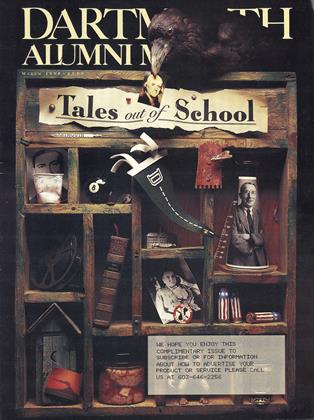YOU HAVE TO hear English professor Jim Cox's voice that dramatic, sibilant, southern voice—to appreciate this story fully. In one of his lectures, Cox noted that in 1826 Edgar Allen Poe—alcoholic, drug addict, death-fascinated nineteenth-century romantic—arrived as a freshman at the University of Virginia exactly one week before Thomas Jefferson died. What a contrast: Poe and Thomas Jefferson—the Enlightenment's culmination and best representative, a leading scientist.
Said Cox: "I like to imagine Jefferson—author of the Declaration of Independence, founder of the first public university in America—the University of Virginia—architect of the incomparable Monticello—sitting on the front porch of that magnificent home of his, looking down on that beautiful campus. He notices some dark, unkempt-looking creature dragging himself across the Lawn. He takes out his spyglass and looks through it. He says, 'My Gawd, it's Poe!' and POW! He keels over dead!"
PROFESSOR Cox's Virginian accent would get stronger when he was defending the greatness of writers born in the South against the too-prevalent notion that they were mere "regional writers." '"Well, he's good, he's a good southern writer,"' he would mock some condescending northern critic. "My Gawd! Faulkner?! William Faulkner! As I LayDying! The Sound and the Fury! A southern writer,' you say? What a power! Eudora Welty?" he shouts, adoration in his voice. '"A southern writer,"' he says sarcastically. "Hah!"
Where did we get this notion that southern writers were second-class citizens? With the combination of play-fulness and righteous indignation in his eye, Cox continues: "I like to imagine that when Lee surrendered to Grant at Appomattox, Grant said to Lee, 'Now, Lee, tell your men they can keep their rifles for hunting, and they can keep their horses for the spring plowing. But from now on,'" and Cox leans, Grant-like, across the imaginary treaty table, '"From now on, you and I will agree that all southern writers are BAAAD!'"
JAMES MELVILLE COX was as fascinated by dates as he was by names. ("I just think it's MARVELOUS that the quintessential New England poets are named Robert FROST and Walter HARD!") After lecturing on Gertrude Stein and her innovative abstract prose style, he observed with deadly serious demeanor, "On August 6, 1945, the atomic bomb was dropped on Hiroshima. On July 27, 1946, Gertrude Stein died at the age of 72. Now, now don't misunderstand me: I'm not saying the Bomb killed her," Cox said. "That would be ridiculous, of course. That's not what I am saying. But I think it's marvelous marvelous! to think that Gertrude Stein could not face the Atomic Era!"
Quoth the raven: "Nevermore, Tom."
West's Last Stand ANLP RECORD exists of the final lecture delivered At the end of the lecture the Dartmouth Marching Band entered the hall, serenading West, and a red-coated waiter appeared with a silver tray on which rested a scotch and soda. Professor West toasted himself and his class as the and played on. Thaddens Seymour '49A
 View Full Issue
View Full Issue
More From This Issue
-
 Cover Story
Cover StoryGetting Things Right
March 1995 By Donald Goss '53 -
 Cover Story
Cover StoryThe Tasting
March 1995 By John R. Scotford Jr. '38 -
 Cover Story
Cover StoryDiseased With Poetry
March 1995 By Everett Wood '38 -
 Cover Story
Cover StoryQuite Good
March 1995 By Abner Oakes IV '81 -
 Cover Story
Cover StoryPoesis
March 1995 By David Bradley '38 -
 Cover Story
Cover StoryRousseau Cops an Exam
March 1995 By Philippa M. Guthrie '82
Features
-
 Feature
FeatureA SPUR TO SCIENCE EDUCATION
January 1958 -
 Feature
FeatureHonorary Degrees
JUNE 1978 -
 Feature
FeatureAn Uulikely Medical School
DECEMBER 1997 -
 Feature
FeatureRAKES WHO CLIMB
FEBRUARY 1994 By Deab Engle '91 -
 Feature
FeatureSecond Panel Discussion
October 1951 By EDGAR W. McINNIS -
 Feature
FeatureGreat Britton
Mar/Apr 2008 By Jennifer Wulff ’96


